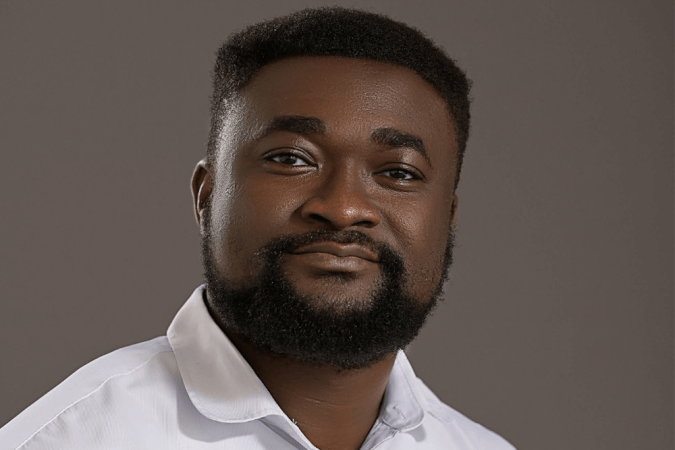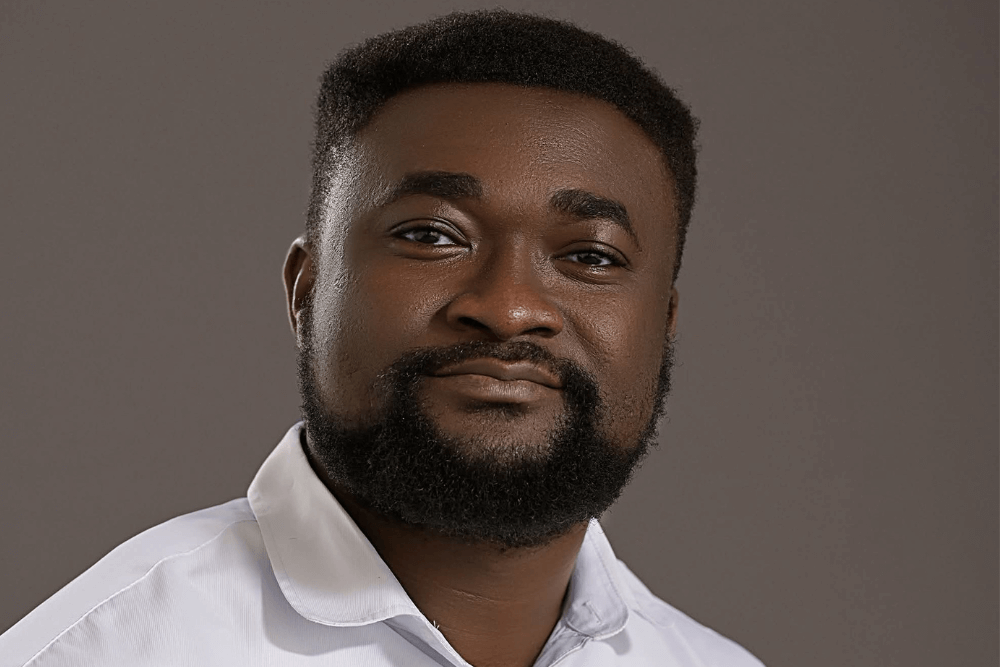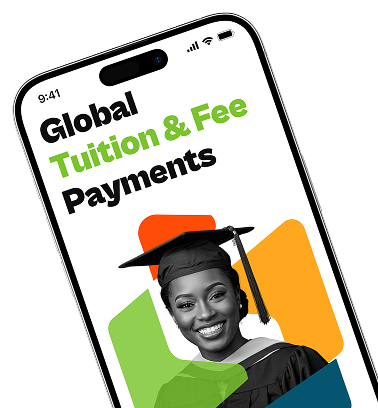Can you introduce yourself to us?
I'm Festus Cobena Ainoo, and affectionately known as Sir Cobby in Ghana. I hold undergraduate degrees from the University of Cape Coast and the University of the People. At the University of Cape Coast, I pursued secondary education, majoring in history and minoring in religion. And then I earned my first master's degree from the University of Cape Coast, with a Master of Arts in Religion and Human Values.

I then came to the U.S. to continue my work in the field of higher education and student affairs, which I am passionate about. So I'm currently at the University of Massachusetts. I'm pursuing a master's in higher education. I'm a first-generation student, and I love mentoring people. I'm interested in all the good aspects of leadership.
Many people are unaware of your study abroad movement. Could you share with us, especially since you didn't receive your visa the first time, despite your extensive experience in this field?
I started introducing people to the idea of studying abroad in 2020. So I started helping people come to the U.S. to study, my students, friends, and colleagues. I was just doing this stuff for them.
The Study Abroad Journey
Sometimes, I go to the classroom, and then my student will ask me, 'Sir Cobby, when are you leaving Ghana?' All your friends are leaving, and you're helping people to leave. Why are you not going? Then, maybe around 2022, I'll give it a thought. I'll just apply to some schools and see how it goes.
I received a couple of offers from schools and funding. Out of that funding, I think the one that offered the most lucrative opportunity was the University of San Francisco in California. So I went to the U.S. Embassy in Ghana for my first visa interview, and I think the deficit that I had was less than I think 11k or so.
The Visa Denial
I went for the interview, and everything was going well. I explained why I'm pursuing this program and how it aligns with my academic background, as well as my future interests. And then the vice officer asked me, So, how am I funding the deficit? And I'm like, okay. I have a relative who will be handling the remaining funds I need to pay, and I have given her the profile.
She said, "Okay, can I see his bank statement? So I gave the bank statement to him. She was just doing some calculations and other stuff.
And then, she has the question, “Why do I have this huge deposit in the bank statement?”
I'm like, “So you look at the bank statement flow that has been consistent and that happens to the account and all that, and then the man is a businessman and he's engaged in a lot of stuff. People actually transfer a lot of money into his account." Then she was like, “This time, I cannot approve your visa. Go and work on your financials and reapply again."
I was glad that she actually identified the area that led to my denial, suggesting that I should work on my finances and reapply from there. I was so down because I was doing this whole thing myself.
The Family Factor
I don't have any family, so I'm trying to push you and support you in doing it, and all that. So I just had to let it go. And then my mom told me that whatever is yours would be yours forever. And then I remember calling my dad in the evening when I returned to the University of Cape Coast, as I was a teaching staff member there.
Then my dad said that I don't have to give up on a dream that would benefit many people. And I'm like, ' Okay, so now I have inspirational speakers in my life. ' I got the inspiration to continue looking into considering other applications.
Learning from Mistakes
One thing that helped me was that I was able to identify those loopholes in my first application. Then I refined my documents and the information I used to apply for the various programs I pursued. And then, just within a week after I sent in my applications to some schools, I received the best funding offer from a private school.
They gave me a straightforward scholarship of around $24,000. And I'm like, "Oh, so the thing can actually be easy when I put in the work."
From there, I began to discover myself more, especially in my field, as I had previously helped others, but pushing myself was the difficult part for me. I started my application and received some school offers, but then I wasn't in a hurry to leave my country.
The Scholarship Factor
I was interested in coming to the U.S. to study on a scholarship or a fully funded scholarship. Why? As a first-generation student, I am aware of the background I'm coming from. There's no way they can, I mean, my whole family can sell. If they sell all the inheritance and other stuff, that wouldn't match up to the money I'm supposed to pay as tuition, and even the cost of living.
So that's what really got me into exploring other schools. I looked into Ivy Leagues. Although my GPA wasn't very strong, I was eager to push myself to improve it. I applied to a couple of schools. I applied to Harvard. I applied to Yale, Brown University, and all the top schools I am aware of, including Syracuse, as well as my current institution, the University of Massachusetts Amherst.
A couple of them gave me good funding. That's how the first visa denial kind of pushed me to figure out what I wanted for 2024.
The CGPA Factor
What is the opportunity for a person with a low CGPA to get a fully funded scholarship like yours?
Yesterday, we had a department meeting, and we welcomed the current student who has joined our department. Then, my professor, who is also my academic advisor, was asked why he had chosen the other Ghanaians who had been accepted into the department.
Now, he said it's not basically about GPA, right? Sometimes, first-class students think that they have it. So that's all. I mean, "I don't need to do any work. I don't need to struggle to tell people. I am good for their programs." What actually happened is that sometimes institutions here in the USA do what we call holistic application review. You may think that you have a first-class grade or a grade like 3.6, 3.7, or possibly 4.5 or 4.2, depending on the GPA scale you are using. But someone with at least maybe a second-class upper has a lot of stuff to talk about.
The Extracurricular Activities Factor
One of the things I've realized so far with most students is that, especially where I'm coming from in Ghana, we don't really involve ourselves much. I've been to Nigeria a couple of times, almost five or seven times, and I've seen how our systems try to lead people to believe that everything about academic success is just about getting a good GPA.
We don't look at extracurricular activities; there are a few people who may be involved in them. And so for me, I was really engaged on campus. I was a student leader. I was presenting at various conferences in Nigeria, as well as in Benin, and at many United Nations agencies.
Additionally, I undertook some organizational and NGO work that was personally funded. I received numerous awards. I believe that by the time I completed my studies at the University of Cape Coast, I had received 24 awards to my name. That alone wouldn't let anyone say, 'Oh, this applicant has a GPA of, let's say, 3.0.' So the person is not qualified for our program.
Beyond the CGPA
My advisor said that they look beyond your GPA. They want to see what you bring to the table, to your program, and how the program alignment will help you to achieve those career goals that you've written in your statement of purpose or those essays that you write. I always try to encourage people sometimes; people call me "the low GPA booster."
I try to let people understand that there is a school for everyone. The USA is made up of over 4,000 schools. I mean, more than that, right? Some schools do accept students with low GPAs. I know a school that accepts a GPA as low as 2.3, depending on your circumstances.
Finding the Right School
The most difficult aspect is that people are trying to identify the effect for those schools and then those programs, because if you're able to do that, maybe you have five or six or seven schools that your GPA, your requirements, and everything, make it much easier for you to get into the program and then get the funding. But I also say that it's all about consistency. It's all about committing yourself to it, and don't always look down on the GPA you hold, because we've had people with a GPA of 2.1 or 1.9 who have entered the U.S. with funding. They just have to put in the work and then get the right mentorship.
The Mentorship Factor
Talking about mentorship, you've done quite well for yourself. But before we discuss mentorship, can you tell me if you've made an impression in fully funding a scholarship? Can you tell us what scholarship you got before you travelled to the U.S.?
In 2024, I believe I had seven fully funded scholarships for the field of higher education that I'm currently in. And then I had four other fully funded scholarships, as I was also considering a master's program in ecotheology. My research at the University of Cape Coast at the time was centered on ecological teachings related to environmental sustainability.
I was interested in ecotheology, exploring how Christian values and theological underpinnings can support environmental sustainability in the world.
Admission to Ivy League Schools
I applied to Yale and Harvard. Additionally, I was applying to Princeton, but since I didn't have any published papers, I had to reconsider my application. I was accepted into Yale and Brown University, but Harvard denied my application. That was a significant blow to me, even though I knew my GPA wasn't good for my age.
Research alignment was very clear to the faculty who wanted to work with me. However, I was then happy to have been accepted into those two schools, and I proved to myself that a low GPA wasn't a hindrance. Someone may see it as low, but that's the equivalent of a second-class upper in Ghana, and when you take it into the U.S. system, that's around a 3.4 on a 4.0 scale.
I had to focus on schools where my research aligns with the faculty's interests, and also try to align my career goals with the department's mission and objectives. Sometimes I had to reach out to faculty members. I set up meetings with some of them. Some of them had the time to review my statement of purpose and then my SOPs for me, even before I applied to the department.
That was very helpful for me. But above all, I think the mentorship I provide to others has also allowed me to refine myself day in and day out. I was refining my statement of purpose, my CVs, and all that, because when I'm holding meetings for people, I need to also show up and make them know that, OK, I'm also doing the work.
In total, I secured 11 fully funded admissions, and for the seven in the field of higher education and student affairs, it gave me everything. It provided me with housing and a meal plan at school. Some provided me with two-bedroom apartments and then covered the cost of food using a waiver, health insurance, and all the other benefits. From there, I developed the concept that I believe I can do more to help people.
And so that's when the idea of mentorship came in. Now focusing more on the mentorship and giving people the opportunity to believe in themselves, regardless of where they stand.
Last year, we had a student who came in with a GPA of 2.4 on a 4.0 scale, who had a fully funded offer. Sometimes people ask, “How do we do this? How do we do that?”
The Statement of Purpose Factor
How can a person have SOPs that stand out?
Powerful question. To cut it short, tell your story. I always say, tell your story. Most often, I see people saying, 'Hello, I'm done writing my CV. Can you read it for me?' Then I'll say, Go and read it again. Now, read it to your friend, your mom, your auntie, your sister, and your siblings. Ask them if what you read makes sense. Sometimes people rush.
There's no point in rushing this journey. Suppose you have to work on your SOP and your document. I did for three solid months, rewrote everything, and I was just writing and rewriting before submitting to those schools.
SOP & Low GPA Factor
In the document, I always tell people, "Tell your story." There's a lady who reached out to me, and then she completed her studies at the University of Ghana. And then she was like, "My GPA is very low. I have a GPA of 2.6, but I don't know how I fit into the study abroad dream.” And I'm like, “Can you tell them your story?”
She told me a great deal about what had happened to her on campus. I mean, those stuff that happens in most African institutions. And then I'm like, yeah, that's also part of your story. So you know what? Just proceed and write a single page. One single page. Explain the reason that led to your low GPA.
In addition to your statement of purpose, write a one-page document and send it to me for review. "Don't go and copy anyone's story. Tell me why, first of all, you are interested in applying to your department now, which is my story."
This lady wrote the story and then utilized three factors that significantly contributed to her funding. When I read that story and the statement of purpose, I told her that any school she wants to submit this statement to, as long as she meets their GPA, or if she doesn't meet the GPA, people will find a way to give her admission and funding.
The first school came and offered her, I think, $16,000 in scholarships, which was straightforward when the admission came. Then she submitted to another school, I think somewhere in Denver. They also gave her $34,000 scholarship. Then she came back, telling me what different things she could do to ensure the schools improved their funding.
And I'm like, "You've not highlighted all the things you did. I know you want to keep your resume brief. Can you tailor the most important things you did during your undergraduate studies and connect them to the work you've done in social work, and how those apply to the context of studying in the U.S.?
How Do I Write a Statement of Purpose (SOP)?
In your statement of purpose, be genuine apart from that; connect your experiences and how they have prepared you to the program you're applying for, and how the program would support you.
To achieve your career goals, ensure that your career objectives align with the existing programs and initiatives. You also need to ensure that you are showing genuine interest. If it's a research-based program, you are reaching out to faculty members and connecting your research interest to them, while you are doing all this writing.
Lastly, I would recommend having a clear career path or career goal. Sometimes people are, oh, "I want to set up a research lab." Come on. We have numerous professors in Nigeria, Africa, and in Ghana, yet they haven't established a research lab. If you are pursuing a master's program, ensure that you have a few small, immediate goals that you know you can achieve with a master's degree.
Do Professors Read SOPs?
My professor said they read the statement of purpose, and the funny thing is that they may not even have the time to review the transcript. Why? Because they know that every student coming from Africa has a 3.0 GPA. Look at what he said.
He said that every student coming from Africa meets the 3.0 GPA requirements for most graduate studies in the U.S., meaning that they are interested in the other documents that you submit, maybe your CV, your resume, your statement of purpose, statement of intent, personal statement, or any additional document that you add. And so those are the things that they also look into. I would advise anyone to focus on those materials.
When is the best time to submit my SOP?
I always advise people to review their documents before submitting them to the schools. After you have identified the schools that you want to apply to, you've read around them well, you've read the faculty's work and all that, focus on writing them now.
At some of the schools, you can attach your SOP to the application on the website before you make payments. Others, you have to make payments before you upload those documents. That varies depending on the country you are looking at. The U.S. is different; Canada is different. I've done Sweden and Finland for people. Those things are also different there. It depends on where you're applying and the specific institution itself, as they operate differently from one another.
The DS 160 Factor
What are the common mistakes students make when it comes to going for their visa interviews?
They don't pay attention to details. I would say I didn't pay attention to much of the first DS 160. I felt I wanted to be sincere. I didn't pay attention to that because, within the DS-160 DS-160, I was supposed to include both my current work and my previous one.
Additionally, there was a person who requested that I include my senior high school education. Now, I realized that I didn't include the senior high school one, and then I combined the current work with the previous one as well.
I always tell people that this will be very critical when filing the DS-160,, making sure that the information they are entering into the DS-160 isis accurate. And then they should also review. They should let someone review for them. Sometimes you may think that you have done the right thing in the DS-160 form. You should send it to someone, and then you realize you actually messed up. So that also happened to me.
I realized that even though the visa officer advised me to work on my financials, I had made mistakes on my first DS-160. I didn't include my senior high school education, misplaced my current and then the previous work experiences. Those are some of the things that they are also looking for.
There's one component I discovered just two years ago, specifically for anyone who has visited the U.S. embassy before and been denied.
How to fill DS-160 after refusal
Have you been denied a U.S. visa application before? And mostly, if you have been denied, you select yes. Now, they say that briefly. Most of the DS-160 I've read so far, "People say that I was denied under 214B”. That's not an explanation.
That's a sentence, right? You have to explain why you think you were denied because you don't know. Most of us are unaware of the reasons behind our visa denials. Still, if you have been denied an F1 visa under the 214B provision, you should consider your funding and how you responded to the consulate's questions.
You must use all the information that has been stipulated and draft your explanation in your DS-160. You can write, "I think these are the reasons that led to my denial (write them). After that denial, I have worked diligently to refine my story and improve my application.
Currently, I've secured additional funding and any other resources that you believe would give me an advantage. I chose to pursue this program here for this reason, and I'm actually going to pursue it for the same reason. I'm going to come back to my country to contribute to this area. "It may be like 250 words, 200, or 150 words. You are good to go.
How can I convince a visa officer?
The funny thing is, I have a friend who served as a visa officer, and this is where I got most of my experiences from. He told me that the first thing, immediately upon approaching them, they have that conception: you are not coming back.
So they want you to prove to them wrong? So what do you do? The application you submitted before them is what they are using. If those are already full of mistakes, they have a point to deny your visa. I always advise people to review all those things thoroughly and ensure they are seeking expert advice. And when advice is given, you need to scrutinize it and then find one that works with you.
This is so insightful. So, finally, Festus, how would you advise a prospective international student from Ghana, Kenya, Rwanda, or any other African country on coming to the U.S. or any part of the world?
For me, the first thing I would recommend is to secure funding through scholarships, fellowships, or assistantships. Why? Because it is not easy to pay tuition here. I wouldn't lie to anyone. Sometimes people get a job, but you are coming here to study.
The funny thing is that my friend, a former visa officer, said that sometimes people bring huge bank statements to the embassy. When they arrive in the U.S., they cannot afford to pay tuition. I always encourage people to get funding and apply to good schools.
The Red Flags
It's not every school that requires an application. Some schools are just seen as red flags. Whenever you visit the embassy, they view those schools as red flags. So apply to good schools, get funding, and I know it could be difficult, right?
I know that the embassies denied some applicants with fully funded scholarships, as we're all coming in 2024.
Can a U.S. visa denial be appealed?
I just asked them to write an email to their international programs offices. And let them contact the U.S. embassy in Nigeria or Ghana and inquire about the reason for their visa denial. Those people were having full funding, and the schools reached out to the embassies. "We were expecting these applicants to come here. We have given them this offer now that everything looks good in the application. Could you please explain why you denied them?
Then my friend received an email from the embassy stating that he should appear at the consulate on this date at this time. He went there, and they were like, "Oh, can I get your passport? Can I get your I-20, blah, blah, blah? Then they approved the visa.
It is quite tricky for a consular to deny someone with full funding. Being frank with you, I've been doing this for five years, so I know what it's like. Either that or that, sometimes it can also be the God factor.
The God Factor
I always tell people that my first visa was denied because of God. Why? I wouldn't have been able to pay the $11,000 when I arrived in the U.S., considering the circumstances now. Where am I going to work? Where will you find a job? As I mentioned, as a student, you are not supposed to work outside the campus. You are supposed to work on campus. Those are essentially just a small stipend, like a penny, that they are giving you.
I would encourage people who are here to begin this journey to focus primarily on securing funding, gaining admission to reputable schools, and seeking the right mentorship. And I believe with that, yeah, they should be good to go and go through the visa processing times as well. This has been so insightful for us all.
How to get external funding and grants
I think a couple of folks I've worked with had external scholarships. I know a lady who is going to Oxford this year. I think she should be there now, pursuing a master's in education, having received a scholarship from the Mastercard Foundation. I know someone who also had a scholarship experience with AAEUW, or so I've heard. It's for women who want to pursue graduate programs anywhere in the U.S., the UK, or other countries. And so, apart from that, some of them also come directly from faculty members.




